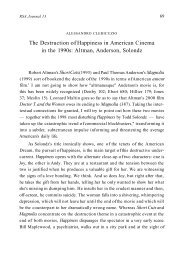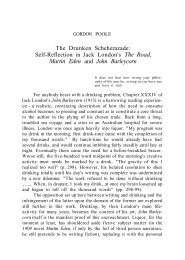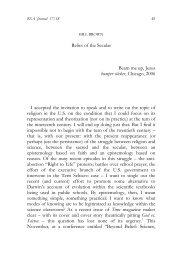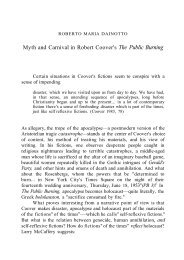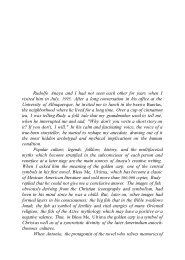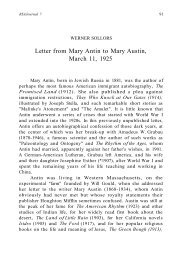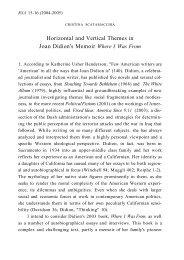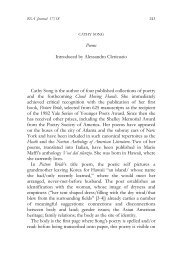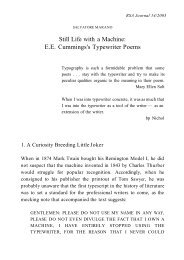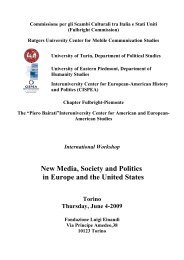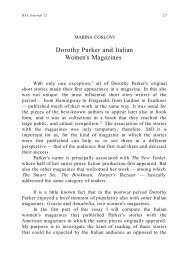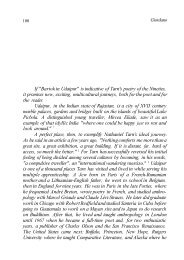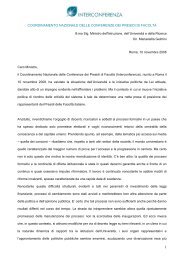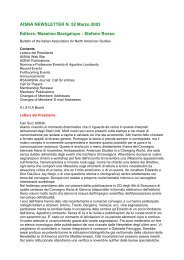An American Jeremiah in Rome: A Study of Margaret Fuller's ... - aisna
An American Jeremiah in Rome: A Study of Margaret Fuller's ... - aisna
An American Jeremiah in Rome: A Study of Margaret Fuller's ... - aisna
- No tags were found...
You also want an ePaper? Increase the reach of your titles
YUMPU automatically turns print PDFs into web optimized ePapers that Google loves.
RSA Journal 11<br />
103<br />
PAOLA GEMME<br />
<strong>An</strong> <strong>American</strong> <strong>Jeremiah</strong> <strong>in</strong> <strong>Rome</strong>:<br />
A <strong>Study</strong> <strong>of</strong> <strong>Margaret</strong> <strong>Fuller's</strong> Tribune Dispatches<br />
"I go to behold the wonders <strong>of</strong> art, and the temples <strong>of</strong> old<br />
religion", declared <strong>Margaret</strong> Fuller to the readers <strong>of</strong> her literary<br />
column <strong>in</strong> the New- York Daily Tribune at the eve <strong>of</strong> her departure<br />
for Europe <strong>in</strong> August 1846. "But I shall not see", she added with<br />
reassur<strong>in</strong>g nationalistic pride, "no [sic] form <strong>of</strong> beauty and majesty<br />
beyond what my Country is capable <strong>of</strong> produc<strong>in</strong>g <strong>in</strong> a myriad variety<br />
if she has but the soul to will it." 1 As she traveled through England<br />
and France and eventually settled <strong>in</strong> Italy, however, Fuller was to see<br />
and report about much more than the masterpieces <strong>of</strong> European art.<br />
She was <strong>in</strong> <strong>Rome</strong> when the newly-elected reformist pope Pius IX<br />
refused to go to war aga<strong>in</strong>st Austria and thereby lost the support <strong>of</strong><br />
his subjects, who had hoped he would assume the role <strong>of</strong> moral<br />
leader <strong>of</strong> the political reform <strong>of</strong> Italy. She witnessed the people's<br />
grow<strong>in</strong>g opposition to papal rule, which culm<strong>in</strong>ated <strong>in</strong> the murder <strong>of</strong><br />
conservative prime m<strong>in</strong>ister Pellegr<strong>in</strong>o Rossi and the assault on Pius<br />
IX's own residence to demand the appo<strong>in</strong>tment <strong>of</strong> a liberal m<strong>in</strong>istry.<br />
She rema<strong>in</strong>ed <strong>in</strong> <strong>Rome</strong> after the pope fled the city and a<br />
Constitutional Assembly elected by universal male suffrage<br />
proclaimed the end <strong>of</strong> the temporal rule <strong>of</strong> the popes and the<br />
establishment <strong>of</strong> a republic <strong>of</strong> the people. <strong>An</strong>d she stayed on<br />
throughout <strong>Rome</strong>'s brief republican <strong>in</strong>terlude from February to July<br />
1849, when the French army that had come to the aid <strong>of</strong> the pope<br />
succeeded <strong>in</strong> conquer<strong>in</strong>g the city despite the tenacious resistance put<br />
up by the Romans and liberal volunteers from all over Italy. 2 As she<br />
described these events <strong>in</strong> her dispatches to the Tribune, Fuller<br />
deviated from the nationalist position she had adopted <strong>in</strong> 1846.
104 RS A Journal 11<br />
While she had then believed that the presence <strong>of</strong> democracy<br />
rendered America superior to Europe <strong>in</strong> spite <strong>of</strong> the latter's cultural<br />
patrimony, <strong>in</strong> revolutionary <strong>Rome</strong> she reversed the comparison to<br />
elevate Italy over America. By April 1848, she was writ<strong>in</strong>g to her<br />
readers that she could not be persuaded to return home because<br />
"My country is at present ... stupid with the lust <strong>of</strong> ga<strong>in</strong> [and] soiled<br />
by crime <strong>in</strong> its will<strong>in</strong>g perpetuation <strong>of</strong> Slavery", whereas <strong>in</strong> <strong>Rome</strong>,<br />
"amid the teach<strong>in</strong>gs <strong>of</strong> adversity a nobler spirit is struggl<strong>in</strong>g—a spirit<br />
which cheers and animates m<strong>in</strong>e." 3 Italy had seem<strong>in</strong>gly become <strong>in</strong><br />
her m<strong>in</strong>d freer than America.<br />
These statements, coupled with <strong>Fuller's</strong> praise <strong>of</strong> the conduct<br />
<strong>of</strong> the Roman revolutionists aga<strong>in</strong>st allegations that the city had<br />
fallen <strong>in</strong>to anarchy, her censure <strong>of</strong> the French military <strong>in</strong>tervention,<br />
and her repeated calls for <strong>American</strong> expressions <strong>of</strong> sympathy<br />
towards the new republic—not to mention her own participation <strong>in</strong><br />
the defense <strong>of</strong> <strong>Rome</strong> as the director <strong>of</strong> one <strong>of</strong> the city's hospitals<br />
for the wounded—have led critics to read <strong>Fuller's</strong> account <strong>of</strong> the<br />
Roman republic as an anomaly among <strong>American</strong> recreations <strong>of</strong><br />
mid-n<strong>in</strong>eteenth-century Italy. Accord<strong>in</strong>g to the accepted <strong>in</strong>terpretation<br />
<strong>of</strong> the Tribune dispatches, while her compatriots either ignored the<br />
Risorgimento altogether and cont<strong>in</strong>ued to perceive Italy <strong>in</strong> a purely<br />
aestheticized manner, or described it negatively and with the<br />
purpose <strong>of</strong> celebrat<strong>in</strong>g America's political exceptionalism, Fuller<br />
not only made contemporary Italy the focus <strong>of</strong> her narrative, but<br />
exalted Italian republicanism over <strong>American</strong> democracy. 4 Bell Gale<br />
Chevigny best expresses this critical consensus when she argues<br />
that Fuller was "radically apart" from those <strong>American</strong> travelers <strong>in</strong><br />
Italy who "came to confirm their sense <strong>of</strong> national superiority" and<br />
"refurbish their sense <strong>of</strong> special dest<strong>in</strong>y." 5 On the contrary, writes<br />
Chevigny, "Fuller denied the specialness and autonomy <strong>of</strong><br />
<strong>American</strong> dest<strong>in</strong>y [and] <strong>of</strong>fered the actual struggle <strong>of</strong> a foreign<br />
people as a guide to complet<strong>in</strong>g the <strong>American</strong> Revolution." 6<br />
This essay <strong>of</strong>fers a different <strong>in</strong>terpretation <strong>of</strong> <strong>Fuller's</strong><br />
encounter with Italy. Instead <strong>of</strong> read<strong>in</strong>g her negative comparison<br />
between democracy <strong>in</strong> Italy and America <strong>in</strong> isolation, I situate it<br />
with<strong>in</strong> the broader context <strong>of</strong> <strong>American</strong> oratorical practices. I argue<br />
that, far from be<strong>in</strong>g an exceptional and unprecedented statement,
RSA Journal 11<br />
105<br />
<strong>Fuller's</strong> critique <strong>of</strong> America lies with<strong>in</strong> the tradition <strong>of</strong> the jeremiad,<br />
a lament over the nation's failure to live up to its orig<strong>in</strong>al promise,<br />
which, I underscore, reaffirms national dreams while deplor<strong>in</strong>g the<br />
failure <strong>of</strong> will to pursue them. 7 I f<strong>in</strong>d confirmation <strong>of</strong> <strong>Fuller's</strong><br />
adherence to the ideology <strong>of</strong> <strong>American</strong> republican exceptionalism<br />
<strong>in</strong> the comparison between the public discourse <strong>of</strong> the dispatches<br />
and the private text <strong>of</strong> her correspondence and personal journal.<br />
While the public dispatches mostly <strong>of</strong>fer a celebratory image <strong>of</strong><br />
revolutionary <strong>Rome</strong>, one <strong>in</strong>tended to shame America <strong>in</strong>to<br />
redress<strong>in</strong>g her wrongs, the private letters, which do not have that<br />
purpose, <strong>of</strong>ten express doubts about the Italians' read<strong>in</strong>ess for<br />
republicanism and at times contrast sharply with the positive<br />
evaluations <strong>of</strong> the dispatches. 8 Even the dispatches, moreover, are<br />
occasionally characterized by an aestheticized approach to the<br />
Roman revolution which betrays <strong>Fuller's</strong> <strong>in</strong>ability to escape<br />
nationalistic ideology <strong>in</strong> spite <strong>of</strong> her <strong>in</strong>sights elsewhere <strong>in</strong>to the<br />
identity <strong>of</strong> discourses <strong>of</strong> power which <strong>in</strong>tend to marg<strong>in</strong>alize nondom<strong>in</strong>ant<br />
groups, <strong>in</strong>clud<strong>in</strong>g the very patriarchal rhetoric she had<br />
critiqued <strong>in</strong> her fem<strong>in</strong>ist writ<strong>in</strong>gs.<br />
The Critic as <strong>Jeremiah</strong><br />
By the time she left for Europe to report on popular revolts<br />
aga<strong>in</strong>st extreme political and economic stratification <strong>in</strong> England.<br />
France, and Italy, Fuller had become an outspoken critic <strong>of</strong><br />
America's own deviations from the pr<strong>in</strong>ciple <strong>of</strong> human equality.<br />
She had denounced patriarchal restrictions on women's right to the<br />
development and expression <strong>of</strong> their natures <strong>in</strong> Woman <strong>in</strong> the<br />
N<strong>in</strong>eteenth Century. She had censured racial prejudice aga<strong>in</strong>st<br />
Native <strong>American</strong>s <strong>in</strong> Summer on the Lakes <strong>in</strong> 1843, an account <strong>of</strong> a<br />
trip west which allowed her to witness the devastat<strong>in</strong>g effects <strong>of</strong><br />
<strong>American</strong> imperialism upon the orig<strong>in</strong>al <strong>in</strong>habitants <strong>of</strong> the land.<br />
Encouraged by Horace Greeley, the liberal editor <strong>of</strong> the New-York<br />
Daily Tribune who had hired her as the lead columnist <strong>in</strong> 1844<br />
moreover, she had written a series <strong>of</strong> bit<strong>in</strong>g articles rang<strong>in</strong>g from<br />
condemnations <strong>of</strong> the war aga<strong>in</strong>st Mexico, which she read as a
106 RSA Journal 11<br />
means to preserve slavery, to exposures <strong>of</strong> the grow<strong>in</strong>g levels <strong>of</strong><br />
abject poverty <strong>in</strong> develop<strong>in</strong>g urban communities. 9<br />
For Fuller, who had been tra<strong>in</strong>ed by her Harvard-educated<br />
lawyer and congressman father <strong>in</strong> the political and rhetorical<br />
tradition <strong>of</strong> the revolution, 10 the emergence <strong>of</strong> <strong>in</strong>equality <strong>in</strong> America<br />
on the multiple axes <strong>of</strong> gender, race, and class stood <strong>in</strong> sharp<br />
contrast with the egalitarian pr<strong>in</strong>ciples upon which the country had<br />
been founded. It is precisely as a breach <strong>of</strong> democratic promise<br />
that Fuller constantly depicts the corruption <strong>of</strong> republicanism that<br />
accompanied national geographical and economic growth.<br />
Comment<strong>in</strong>g on the news <strong>of</strong> a U.S. victory <strong>in</strong> the struggle with<br />
Mexico over Texas, a conflict caused to a large extent by the<br />
<strong>An</strong>glo-<strong>American</strong> colonists' determ<strong>in</strong>ation to employ slave labor <strong>in</strong><br />
defiance <strong>of</strong> the Mexican government, she writes, "Va<strong>in</strong> have been<br />
the hopes that the victories <strong>of</strong> this country would be over wrong<br />
and ignorance, not mere conquest <strong>of</strong> the bodies <strong>of</strong> other men to<br />
obta<strong>in</strong> their possessions or guard our own." That the "wolves <strong>of</strong><br />
war", as Fuller describes her country's aggressive militarism, should<br />
"rage abroad without the slightest excuse from hunger", was all the<br />
more reprehensible precisely because "all omens marked out [this<br />
country] as the dom<strong>in</strong>ion where the hopes <strong>of</strong> the Pr<strong>in</strong>ce <strong>of</strong> Peace<br />
might be realized" . 11<br />
<strong>Fuller's</strong> condemnation <strong>of</strong> national policies as a failure to<br />
live up to the expectation that a country established upon the<br />
declaration that all men are equal would achieve a most perfect state<br />
<strong>of</strong> democracy is by no means idiosyncratic. On the contrary, it is a<br />
text-book example <strong>of</strong> the rhetorical genre that Sacvan Bercovitch calls<br />
the "<strong>American</strong> jeremiad." First produced among seventeenth-century<br />
Puritans as a form <strong>of</strong> ritualistic compla<strong>in</strong>t because <strong>of</strong> the apparent<br />
failure <strong>of</strong> Puritan society to fulfill its task <strong>of</strong> religious self-perfection<br />
and world redemption, the jeremiad survived the demise <strong>of</strong> Puritan<br />
theocracy to become central to <strong>American</strong> political rhetoric. In the<br />
secular version <strong>of</strong> the jeremiad adopted by Fuller and her<br />
contemporaries, America's mission had been re<strong>in</strong>terpreted as a<br />
political one, namely the realization <strong>of</strong> a model democratic society<br />
and the spread<strong>in</strong>g <strong>of</strong> the bless<strong>in</strong>gs <strong>of</strong> democracy world-wide. 12<br />
While the sphere <strong>of</strong> action <strong>of</strong> the jeremiad shifted from
RSA Journal 11 107<br />
religion to politics, its basic elements rema<strong>in</strong>ed the same.<br />
Accord<strong>in</strong>g to Bercovitch, all jeremiads cite the promise that the new<br />
nation would realize a democratic ideal and contrast it with the<br />
present state <strong>of</strong> decl<strong>in</strong>e, whether it be represented by the<br />
endurance <strong>of</strong> slavery or the emergence <strong>of</strong> an <strong>in</strong>digent <strong>in</strong>dustrial<br />
work<strong>in</strong>g class. The measure <strong>of</strong> the failure <strong>of</strong> America to fulfill its<br />
dest<strong>in</strong>y lies <strong>in</strong> the obvious disparity between expectations and<br />
actuality. The exam<strong>in</strong>ation <strong>of</strong> <strong>Fuller's</strong> jeremiads, however, suggests<br />
that the comparison between revolutionary idealism and present<br />
corruption was <strong>of</strong>ten supplemented by an additional comparison<br />
between n<strong>in</strong>eteenth-century America and other coeval or past<br />
civilizations, and that Bercovitch's model may need to be elaborated<br />
<strong>in</strong> new ways. In the article review<strong>in</strong>g the successful U.S. military<br />
campaign <strong>in</strong> Texas mentioned above, for <strong>in</strong>stance, Fuller equated<br />
<strong>American</strong> foreign policy to the aggressive imperialism <strong>of</strong> the Roman<br />
empire. In her words, "Our Stars have lighted us only to the<br />
ancient heathen—the vulgar path <strong>of</strong> national aggrandizement; and<br />
our Eagle, like the Roman, loves better to snatch its prey from the<br />
field than to soar to the purer regions near the source <strong>of</strong> light" . 13<br />
Given that <strong>American</strong> political thought had traditionally imputed<br />
<strong>Rome</strong>'s decl<strong>in</strong>e from republicanism to absolutism and the fall <strong>of</strong> the<br />
empire itself to the city's territorial expansion, <strong>Fuller's</strong> comparison<br />
functioned both as an <strong>in</strong>dex <strong>of</strong> America's political malaise and an<br />
omen <strong>of</strong> worse to come.<br />
In two articles for the Tribune composed on the occasion <strong>of</strong><br />
the new year <strong>in</strong> 1845 and 1846, Fuller used analogies with other<br />
nations extensively to illustrate the decl<strong>in</strong>e <strong>of</strong> <strong>American</strong> democracy.<br />
In her 1845 "New Year's Day", an <strong>in</strong>vective aga<strong>in</strong>st the toleration <strong>of</strong><br />
slavery by the people who had been placed "<strong>in</strong> charge ... [<strong>of</strong>] the<br />
arc <strong>of</strong> human hopes", she compared America and ancient <strong>Rome</strong><br />
once more, this time to declare Christian America <strong>in</strong>ferior to pagan<br />
<strong>Rome</strong>. While the ancients celebrated the new year by "enfranchis[<strong>in</strong>g]<br />
[their] slaves, to show that devotion to the Gods <strong>in</strong>duced a<br />
sympathy with men", <strong>American</strong>s were "busy <strong>in</strong> contriv<strong>in</strong>g measures<br />
that may best rivet the fetters <strong>of</strong> those now cha<strong>in</strong>ed, and forge<br />
them strongest for millions yet unborn"—possibly a reference to<br />
debates <strong>in</strong> congress over the extension <strong>of</strong> slavery <strong>in</strong> territories to be
108 RSA Journal 11<br />
acquired from Mexico or to the production <strong>of</strong> a vast body <strong>of</strong><br />
proslavery literature <strong>in</strong> the 1840s. America, Fuller concluded, had<br />
become worse than Austria: the most conservative <strong>of</strong> all European<br />
powers would at least appeal only to the "legitimacy <strong>of</strong> blood", the<br />
absolute power <strong>of</strong> the aristocracy over the commoners, to justify<br />
the oppression <strong>of</strong> its subjects, but the United States dared appeal to<br />
"legitimacy as seen from a moral po<strong>in</strong>t <strong>of</strong> view", 14 and pretend that<br />
colonialism and the slave-trade were righteous enterprises. A year<br />
afterwards, <strong>in</strong> "1st January, 1846", Fuller deplored that, with the<br />
annexation <strong>of</strong> Texas as a slave state and the religious persecution<br />
<strong>of</strong> the Mormons <strong>in</strong> Ill<strong>in</strong>ois, her country had further abased itself<br />
and "laid aside the glorious <strong>of</strong>fice, assigned her by Fate, <strong>of</strong> Herald<br />
<strong>of</strong> Freedom, Light <strong>of</strong> Peace to the civilized world." Instead, America<br />
had become like Russia, a nation renowned for its aggressive<br />
foreign policy <strong>in</strong> Eastern Europe, retrograde feudal social structure,<br />
and discrim<strong>in</strong>ation aga<strong>in</strong>st its Jewish m<strong>in</strong>ority. America now<br />
defended its actions "on the true Russian grounds: 'We (the<br />
stronger) know what you (the weaker) ought to do and be, and it<br />
shall be SO." 15 Whatever the term <strong>of</strong> comparison <strong>in</strong> the examples<br />
above, the parallel drawn between the <strong>American</strong> republic and<br />
empires or despotisms past and present always functions to give a<br />
dramatic gauge <strong>of</strong> the state <strong>of</strong> corruption <strong>of</strong> <strong>American</strong> republicanism,<br />
a corruption with which Fuller wants to confront her too complacent<br />
readers.<br />
As a traveler <strong>in</strong> Italy at a time <strong>of</strong> social unrest, Fuller found<br />
new options for her comparative <strong>in</strong>dictments <strong>of</strong> <strong>American</strong><br />
republicanism. In her New Year's day article for 1848, for <strong>in</strong>stance,<br />
she argued that the ideal <strong>of</strong> equality was cherished and pursued to<br />
a further extent <strong>in</strong> Italy, where despotic sovereigns were resolute to<br />
fight it, than <strong>in</strong> the United States, where it had always had the<br />
opportunity to f<strong>in</strong>d full realization. In her words, <strong>in</strong> spite <strong>of</strong><br />
Austrian and Russian tyranny, "Europe toils and struggles with her<br />
idea, and, at this moment, all th<strong>in</strong>gs bode and declare a new<br />
outbreak <strong>of</strong> fire, to destroy old palaces <strong>of</strong> crime". America, which<br />
had been called to be "champion <strong>of</strong> the rights <strong>of</strong> men", had <strong>in</strong>stead<br />
been corrupted by "a boundless lust <strong>of</strong> ga<strong>in</strong>", and turned <strong>in</strong>to "a<br />
robber and a jailer; ... her eyes fixed, not on the stars, but on the
RSA Journal 11<br />
109<br />
possession <strong>of</strong> other men." 16 A few months later, <strong>in</strong> the aftermath <strong>of</strong><br />
the pope's flight from <strong>Rome</strong>, Fuller returned to the idea that the<br />
seat <strong>of</strong> democracy had moved from a corrupted America to a<br />
regenerated Italy <strong>in</strong> the <strong>of</strong>ten quoted passage which has led readers<br />
<strong>of</strong> the Tribune dispatches to consider them an exception among<br />
U.S. narratives <strong>of</strong> the Italian revolutions. To friends who urged her<br />
to return home by prais<strong>in</strong>g America to her as "the land <strong>of</strong> the<br />
Future", she would reply that "it is so, but that spirit which made<br />
America all it is <strong>of</strong> value <strong>in</strong> my eyes, which gave all <strong>of</strong> hope with<br />
which I can sympathize for that Future, is more alive here at<br />
present than <strong>in</strong> America." 17<br />
Undeniably, Fuller was pronounc<strong>in</strong>g Italy superior to America.<br />
Still, the critic's evaluation <strong>of</strong> the anti-nationalistic import <strong>of</strong> <strong>Fuller's</strong><br />
statements should be tempered by the observation that they occur<br />
with<strong>in</strong> the boundaries <strong>of</strong> the jeremiad, which mandated that the<br />
lament over the corruption <strong>of</strong> <strong>American</strong> democracy be expressed<br />
by means <strong>of</strong> a comparison between promise and actuality. Fuller<br />
had employed such a rhetorical ritual on several occasions before<br />
com<strong>in</strong>g to Europe, <strong>of</strong>ten comb<strong>in</strong><strong>in</strong>g the prescribed comparison<br />
between the revolutionary era and the disappo<strong>in</strong>t<strong>in</strong>g present with<br />
an additional one compar<strong>in</strong>g America and other nations. Whether<br />
the term <strong>of</strong> comparison be, as <strong>in</strong> the early articles, Russia or ancient<br />
<strong>Rome</strong>, or, as <strong>in</strong> the late ones, contemporary Italy, such comparisons<br />
were not <strong>in</strong>tended to have referential so much as argumentative<br />
value. In other words, their purpose was not to describe accurately<br />
the relative state <strong>of</strong> democracy <strong>in</strong> the United States and other<br />
countries, but rather to pa<strong>in</strong>t such a bleak picture <strong>of</strong> republicanism<br />
<strong>in</strong> America as to <strong>in</strong>duce its citizens to take action and redress the<br />
situation. Thus, like the Puritan sermon from which it descended,<br />
<strong>Fuller's</strong> secular jeremiad condemned <strong>in</strong> order to br<strong>in</strong>g about<br />
political regeneration.<br />
As Bercovitch has demonstrated, <strong>in</strong> fact, the essence <strong>of</strong> the<br />
jeremiad is celebration rather than censure. Although it strenuously<br />
denounces social misdeeds, the jeremiad unerr<strong>in</strong>gly ends by<br />
predict<strong>in</strong>g America's imm<strong>in</strong>ent fulfillment <strong>of</strong> the orig<strong>in</strong>al democratic<br />
promise. <strong>Fuller's</strong> lamentations over mid-n<strong>in</strong>eteenth-century America's<br />
aggressive materialism <strong>in</strong> the Tribune dispatches are no exceptions.
110 RSA Journal 11<br />
America may have "betrayed" its "high commission" as "advanceguard<br />
<strong>of</strong> Humanity" and "herald <strong>of</strong> all Progress", but it is dest<strong>in</strong>ed<br />
to resume it. There are still <strong>in</strong> the United States, writes Fuller after<br />
hav<strong>in</strong>g declared that enslaved Italy reveres the idea <strong>of</strong> equality<br />
better than democratic America, those, although "a small m<strong>in</strong>ority",<br />
who "earnestly meditate on what is wanted for their country,—for<br />
mank<strong>in</strong>d,—for our cause is, <strong>in</strong>deed, the cause <strong>of</strong> all mank<strong>in</strong>d.<br />
Could we succeed, really succeed, comb<strong>in</strong>e a deep religious love<br />
with practical development ..., we might believe Man has now<br />
reached a command<strong>in</strong>g po<strong>in</strong>t <strong>in</strong> his ascent, and would stumble and<br />
fa<strong>in</strong>t no more." 18 <strong>An</strong>d aga<strong>in</strong>, the spirit <strong>of</strong> democracy may be more<br />
alive <strong>in</strong> Italy than <strong>in</strong> America, but "it will not be so long." America<br />
"is not dead"; she simply "sleepeth", 19 and it is <strong>Fuller's</strong> <strong>in</strong>tent to<br />
wake her. Thus, <strong>Fuller's</strong> jeremiads, which open on the pejorative<br />
comparison between reborn Italy and fallen America, close on an<br />
optimistic vision <strong>of</strong> America regenerated by the confrontation with<br />
its political s<strong>in</strong>s. The Tribune dispatches differ only <strong>in</strong> form from<br />
other strongly nationalistic <strong>American</strong> narratives <strong>of</strong> the Risorgimento.<br />
While other commentators exalted <strong>American</strong> democracy directly<br />
through the negative portrayal <strong>of</strong> Italian republicanism, Fuller<br />
exalted it <strong>in</strong>directly through a positive assessment <strong>of</strong> foreign<br />
revolutions. The path may have been oblique, but the dest<strong>in</strong>ation<br />
was the same.<br />
<strong>Fuller's</strong> critique <strong>of</strong> America, moreover, lies wholly with<strong>in</strong> the<br />
pale <strong>of</strong> nationalistic ideology. In the Tribune dispatches America is<br />
found guilty <strong>of</strong> hav<strong>in</strong>g abdicated its role <strong>of</strong> universal political<br />
model and active advocate <strong>of</strong> democracy worldwide, i.e., <strong>of</strong> fail<strong>in</strong>g<br />
to live up to exalted images <strong>of</strong> national identity. Fuller wishes she<br />
could encourage the Italian revolutionists by tell<strong>in</strong>g them about her<br />
country, but she must <strong>in</strong>stead "stammer and blush" and rema<strong>in</strong><br />
silent about "many th<strong>in</strong>gs"—from political corruption to discrim<strong>in</strong>ation<br />
aga<strong>in</strong>st women and human bondage. 20 She repeatedly asks for an<br />
"expression <strong>of</strong> sympathy" from her country towards the Italians, for<br />
a cannon "to be called AMERICA" which the newly established<br />
Roman Civic Guard could use "for salutes on festive occasions, if<br />
they should be so happy as to have no more serious need". 21 She<br />
pleads that the <strong>American</strong> diplomatic representative to the Papal States,
RSA Journal 11 111<br />
Lewis Cass, be empowered to give <strong>of</strong>ficial recognition to the<br />
republic <strong>of</strong> the people, s<strong>in</strong>ce that government "stands on the same<br />
basis as ourselves". 22 Unable to have any <strong>of</strong> her demands fulfilled,<br />
she warns her country to beware lest she may "perish, like the old<br />
dom<strong>in</strong>ions, from the leprosy <strong>of</strong> selfishness". 23 Underly<strong>in</strong>g these<br />
alternat<strong>in</strong>g appeals and accusations is the assumption that America<br />
has been orda<strong>in</strong>ed to be, as Fuller would put it <strong>in</strong> one <strong>of</strong> her last<br />
reports from Italy, "the star <strong>of</strong> hope to the enslaved nations", and<br />
that "bitter <strong>in</strong>deed were the night if that star were hid from sight by<br />
foul vapors". 24 For all her critique <strong>of</strong> America's political declension,<br />
Fuller thus upholds the notion that the United States is the<br />
epicenter <strong>of</strong> republicanism, that democratic experiments abroad are<br />
<strong>in</strong>spired by the <strong>American</strong> model, and that such experiments require<br />
the support <strong>of</strong> the United States to survive.<br />
Nationalism <strong>in</strong> the Private Sphere<br />
The <strong>in</strong>terpretation <strong>of</strong> <strong>Fuller's</strong> negative comparison between<br />
America and Italy along nationalistic l<strong>in</strong>es is confirmed by an<br />
exam<strong>in</strong>ation <strong>of</strong> the description <strong>of</strong> Italian republicanism <strong>in</strong> texts<br />
other than the dispatches. While critics have privileged the history<br />
<strong>of</strong> the Roman republic she wrote for the Tribune, Fuller also<br />
recounted the events <strong>of</strong> 1848-9 <strong>in</strong> her correspondence and a brief<br />
journal which was rescued from the shipwreck that killed her and<br />
her family <strong>of</strong>f the <strong>American</strong> Atlantic coast. 25 These alternative<br />
versions <strong>of</strong> the revolutions <strong>of</strong> mid-century differ considerably <strong>in</strong> the<br />
evaluation <strong>of</strong> Italian liberalism, which is praised <strong>in</strong> the dispatches<br />
but criticized—at times harshly—<strong>in</strong> the more private texts, a fact<br />
that can be ascribed to <strong>Fuller's</strong> differ<strong>in</strong>g rhetorical purposes <strong>in</strong> the<br />
public dispatches and the private letters and journal. <strong>Fuller's</strong> private<br />
account <strong>of</strong> the Roman Republic resembles <strong>in</strong>stead the vast majority<br />
<strong>of</strong> <strong>American</strong> narratives <strong>of</strong> the Italian revolutions, with which it<br />
shares the contention that Italy's democratic experiments were<br />
bound to fail, at least for the time be<strong>in</strong>g, because <strong>of</strong> the Italians'<br />
civic deficiencies. Despite their seem<strong>in</strong>gly antithetical nature,<br />
however, <strong>Fuller's</strong> private and public histories are fundamentally
112 RSA Journal 11<br />
alike <strong>in</strong> that they both, <strong>in</strong> different ways, embrace a nationalistic<br />
mythology.<br />
<strong>Fuller's</strong> references to the revolutionary army led by general<br />
Giuseppe Garibaldi <strong>in</strong> her writ<strong>in</strong>g for the Tribune and <strong>in</strong> her<br />
correspondence respectively <strong>of</strong>fer a dramatic illustration <strong>of</strong> the<br />
distance separat<strong>in</strong>g her public narrative <strong>of</strong> Italian republicanism<br />
from her private one. In the articles for Greeley, Fuller extolled the<br />
volunteers who defended <strong>Rome</strong> aga<strong>in</strong>st the French siege. She<br />
found them "noble men", "true priests <strong>of</strong> a higher hope", 26 who<br />
"had weighed life and all its material advantages aga<strong>in</strong>st Liberty,<br />
and made their election, ... turned not back, nor fl<strong>in</strong>ched at this<br />
bitter crisis". 27 In fact, she defended them aga<strong>in</strong>st the accusations <strong>of</strong><br />
those <strong>American</strong>s who thought them mercenaries <strong>of</strong> the worst k<strong>in</strong>d.<br />
"Gentlemen who perform their 'duties' to society by buy<strong>in</strong>g for<br />
themselves handsome clothes and furniture with the <strong>in</strong>terest <strong>of</strong><br />
their money", she writes, "speak <strong>of</strong> Garibaldi and his men as<br />
'brigands' and 'vagabonds'." "Such they are, doubtless", she<br />
cont<strong>in</strong>ues <strong>in</strong> seem<strong>in</strong>g agreement, only to proceed on to radical<br />
denial, "<strong>in</strong> the same sense as Jesus, Aeneas and Moses were". 28<br />
While such men controlled <strong>Rome</strong>, she <strong>in</strong>sisted aga<strong>in</strong>st allegation<br />
that the city had fallen <strong>in</strong>to anarchy, she felt so secure as to walk<br />
outdoors unaccompanied, and, she added, "I never saw an act <strong>of</strong><br />
violence." 29 In her letters, however, her comments on Garibaldi and<br />
his soldiers are strongly negative. Writ<strong>in</strong>g to her friend Carol<strong>in</strong>e<br />
Sturgis Tappan from Rieti, to which she had retired to hide<br />
her pregnancy from the <strong>American</strong> community <strong>in</strong> <strong>Rome</strong>, Fuller<br />
expressed her apprehension at the presence <strong>of</strong> volunteer troops<br />
around her <strong>in</strong> terms analogous to those whose accuracy she<br />
questioned <strong>in</strong> the dispatches. Garibaldi's followers are now<br />
"desperadoes" who, she suggests, would not refra<strong>in</strong> from rape. "In<br />
case <strong>of</strong> conflict", she confides to Tappan, "I should fear for the<br />
nurse <strong>of</strong> <strong>An</strong>gel<strong>in</strong>o, the loveliest young woman there". 30 They<br />
metamorphose, as she writes to her lover Giovanni <strong>An</strong>gelo Ossoli,<br />
<strong>in</strong>to dangerous men suspected <strong>of</strong> hav<strong>in</strong>g murdered "a friar [and]<br />
two citizens", so threaten<strong>in</strong>g, she confesses <strong>in</strong> a complete reversal<br />
<strong>of</strong> her assertions <strong>in</strong> the Tribune, that "I surely do not have courage<br />
to go out alone". 31 The vision <strong>of</strong> a heroic revolution pa<strong>in</strong>ted <strong>in</strong> the
RSA Journal 11 113<br />
dispatches is thus ta<strong>in</strong>ted by anarchic overtones <strong>in</strong> the letters,<br />
where the pursuit <strong>of</strong> liberty degenerates <strong>in</strong>to gratuitous explosions<br />
<strong>of</strong> violence aga<strong>in</strong>st not only the representative <strong>of</strong> the old clerical<br />
government, but also the very people <strong>in</strong> whose name the<br />
revolution has been fought. <strong>An</strong>d the implication <strong>of</strong> this description<br />
<strong>in</strong> terms <strong>of</strong> <strong>Fuller's</strong> evaluation <strong>of</strong> the Italians' civic virtue is utterly<br />
negative: their republican efforts, she suggests, lead to the<br />
destruction rather than the reconfiguration <strong>of</strong> the social system.<br />
<strong>Fuller's</strong> public and private histories <strong>of</strong> the Roman republic<br />
further diverge <strong>in</strong> her assessment <strong>of</strong> the military prowess <strong>of</strong> the<br />
volunteer army. While <strong>in</strong> the dispatches Fuller was adamant <strong>in</strong><br />
proclaim<strong>in</strong>g the Italians' courage aga<strong>in</strong>st other foreign observers<br />
who disparag<strong>in</strong>gly declared that "this people would not fight", 32<br />
privately she herself expressed doubts about whether the Romans<br />
would be will<strong>in</strong>g and able to resist the French. About a month after<br />
her first defense <strong>of</strong> the Romans' valor <strong>in</strong> the Tribune, on 28 April<br />
1849, Fuller asked herself <strong>in</strong> the pages <strong>of</strong> her journal, "Will the<br />
Romans fight Outwardly they express great order. The chamber <strong>of</strong><br />
deputies has warmly and unanimously voted to resist. At the<br />
review <strong>of</strong> the civic guard yesterday they gave great promise, yet<br />
somewhere I doubt them all. From my w<strong>in</strong>dow I see now where<br />
they are br<strong>in</strong>g<strong>in</strong>g boards. I suppose to make a support for cannon<br />
and it seems to be such play for men and boys alike." 33 The people<br />
whose "nobler spirit" she had celebrated <strong>in</strong> her jeremiads become<br />
here <strong>in</strong>effectual revolutionists ready with words but not with deeds,<br />
unconscious <strong>of</strong> the import <strong>of</strong> their actions, more like boys play<strong>in</strong>g<br />
at war than men fight<strong>in</strong>g it. <strong>An</strong>d this private characterization <strong>of</strong> the<br />
Romans as braggarts signals, once more, <strong>Fuller's</strong> skepticism<br />
concern<strong>in</strong>g the Italians' capacity for self-government. N<strong>in</strong>eteenthcentury<br />
<strong>American</strong>s had, <strong>in</strong> fact, a martial conception <strong>of</strong> republican<br />
citizenship. Gallantry <strong>in</strong> war was <strong>in</strong>terpreted as a sign <strong>of</strong> political<br />
fitness and lack there<strong>of</strong> as a symptom <strong>of</strong> civic deficiency. To be<br />
judged a coward was therefore equivalent to be deemed unfit for<br />
democracy. 34 As the syntactic proximity <strong>of</strong> grown "men" and<br />
immature "boys" suggests, <strong>in</strong> express<strong>in</strong>g uncerta<strong>in</strong>ty on whether the<br />
Romans would move from words to acts to defend their republic,<br />
Fuller was imply<strong>in</strong>g that they were not quite ready for it yet.
114 RSA Journal 11<br />
Indeed, the conviction that the Italians were not ready to face<br />
the responsibilities <strong>of</strong> democracy pervades the private history <strong>of</strong> the<br />
Roman republic throughout. In a letter to Costanza Arconati<br />
Visconti <strong>in</strong> which she defended republicanism aga<strong>in</strong>st her moderate<br />
friend's preference for constitutional monarchy, Fuller acknowledged<br />
that "Italy may not be ready for it yet." 35 Her statements to the<br />
leader <strong>of</strong> the democratic party Giuseppe Mazz<strong>in</strong>i, who had<br />
returned to Italy from his exile <strong>in</strong> London dur<strong>in</strong>g <strong>Rome</strong>'s brief<br />
republican <strong>in</strong>terlude, also reveal her doubts about the Italians'<br />
fitness for participatory democracy. In reply to his melancholy<br />
assertion that he had come back to die <strong>in</strong> his country after not<br />
be<strong>in</strong>g able to live <strong>in</strong> it, she wrote reassur<strong>in</strong>gly, "You do not return<br />
to sleep under the sod <strong>of</strong> Italy, but to see your thought spr<strong>in</strong>g<strong>in</strong>g<br />
up all over her soil." Still she admitted, extend<strong>in</strong>g the natural<br />
metaphor, that "the gardeners seem to me, <strong>in</strong> po<strong>in</strong>t <strong>of</strong> <strong>in</strong>st<strong>in</strong>ctive<br />
wisdom or deep thought, mostly <strong>in</strong>competent to the care <strong>of</strong> the<br />
garden." 36 <strong>Fuller's</strong> negative evaluation <strong>of</strong> the Italians' political<br />
capacity, however, is <strong>in</strong>variably accompanied by the assurance that<br />
democracy would eventually prevail. In her letter to Visconti she<br />
also wrote, "I am no bigoted Republican, yet I th<strong>in</strong>k that form <strong>of</strong><br />
government will eventually pervade <strong>of</strong> the civilized world." Italy,<br />
she was certa<strong>in</strong>, "would not f<strong>in</strong>d peace earlier. " 37 She similarly<br />
counteracted her critique <strong>of</strong> the Italian patriots <strong>in</strong> her letter to<br />
Mazz<strong>in</strong>i, where she added that his republican ideal "will be able to<br />
use any implements, it is to be hoped will educate the men, by<br />
mak<strong>in</strong>g them work." 38 It is precisely this comb<strong>in</strong>ation <strong>of</strong> refutation<br />
(Italians are unfit for republicanism) and assertion (Italy will—one<br />
day—be republican) that reveals <strong>Fuller's</strong> adherence to nationalist<br />
ideology. Such comb<strong>in</strong>ation, <strong>in</strong> fact, resolves the <strong>in</strong>evitable tension<br />
between two powerful and equally important tenets <strong>of</strong> midn<strong>in</strong>eteenth-century<br />
<strong>American</strong> nationalism, the vision <strong>of</strong> the United<br />
States as "redeemer nation" dest<strong>in</strong>ed to democratize the world by<br />
example and thereby transform other countries <strong>in</strong> its image, and<br />
the equally appeal<strong>in</strong>g notion <strong>of</strong> the United States as "exceptional",<br />
forever different from and superior to other nations. 39 By portray<strong>in</strong>g<br />
Italians as unsuccessful revolutionists, Fuller was contribut<strong>in</strong>g to the<br />
fabrication <strong>of</strong> an exalted image <strong>of</strong> America as the only extant
RSA Journal 11<br />
115<br />
realization <strong>of</strong> democratic ideals. By assert<strong>in</strong>g that Italy would<br />
eventually be democratic too, she was advanc<strong>in</strong>g the myth <strong>of</strong><br />
America's political evangelism. Ultimately, the America <strong>of</strong> <strong>Fuller's</strong><br />
private chronicle <strong>of</strong> Roman republicanism is both emulated and<br />
unequaled, very much the same America one f<strong>in</strong>ds <strong>in</strong> those<br />
allegedly different, "other" accounts <strong>of</strong> the Risorgimento which, to<br />
echo Chevigny's characterization, asserted national superiority and<br />
special dest<strong>in</strong>y.<br />
Fuller, who had celebrated Italy over America <strong>in</strong> her public<br />
history <strong>of</strong> the Roman republic, adopted <strong>in</strong> her private history many<br />
<strong>of</strong> the conventions <strong>of</strong> <strong>American</strong> self-serv<strong>in</strong>g discourse on the<br />
political situation <strong>of</strong> mid-n<strong>in</strong>eteenth-century Italy. While both<br />
histories are characterized by nationalistic ideology, the private<br />
account is no doubt more blatant <strong>in</strong> its proclamation <strong>of</strong> America's<br />
democratic superiority. This difference between the dispatches and<br />
the letters and journal can be accounted for <strong>in</strong> terms <strong>of</strong> their<br />
different rhetorical situations. As Crist<strong>in</strong>a Zwarg and P. Joy Rouse<br />
have demonstrated, Fuller was well aware that the newspaper, as a<br />
mass medium, had an extraord<strong>in</strong>ary capability to affect people's<br />
op<strong>in</strong>ions, and that her job as a columnist for Greeley's Tribune<br />
<strong>of</strong>fered her an unprecedented occasion to address a wide<br />
readership about the state <strong>of</strong> <strong>American</strong> democracy. 40 Fuller the<br />
social critic, <strong>in</strong> other words, found <strong>in</strong> the newspaper a powerful<br />
<strong>in</strong>strument for her plan to chastise America. Given this <strong>in</strong>tent, it is<br />
no wonder that the public history <strong>of</strong> the Roman republic should<br />
elevate Italy over America. Fuller wanted to alert her country to its<br />
political declension and shame it <strong>in</strong>to regeneration, not to <strong>in</strong>dulge<br />
an already <strong>in</strong>flated sense <strong>of</strong> national superiority which risked<br />
mak<strong>in</strong>g it bl<strong>in</strong>d to its own backslid<strong>in</strong>g. S<strong>in</strong>ce America def<strong>in</strong>ed itself<br />
as republican model for all other countries, the celebration <strong>of</strong><br />
Italian over <strong>American</strong> liberalism <strong>in</strong> the dispatches served as<br />
illustration <strong>of</strong> a national corruption from which it was imperative to<br />
recover. The detrimental portrayal <strong>of</strong> the Italian revolutionists that<br />
characterizes <strong>Fuller's</strong> letters and journal derives from the fact that<br />
these private accounts <strong>of</strong> the Roman republic did not have the<br />
civic, reformatory <strong>in</strong>tent <strong>of</strong> their public counterpart. In different<br />
ways, however, both the public and the private history partook <strong>of</strong>
116 RSA Journal 11<br />
nationalist ideology: the former by <strong>in</strong>vit<strong>in</strong>g America to rega<strong>in</strong> its<br />
position <strong>of</strong> republican paragon, and the latter by imply<strong>in</strong>g that<br />
America's preem<strong>in</strong>ence was never challenged by the Italians'<br />
performance <strong>in</strong> the first place.<br />
Aestheticiz<strong>in</strong>g the Revolution<br />
Despite its accuracy, the dichotomy I have del<strong>in</strong>eated above<br />
between a sympathetic public history <strong>of</strong> the Roman republic and a<br />
more critical private one would be reductive and oversimplify<strong>in</strong>g<br />
without the additional exploration <strong>of</strong> how <strong>Fuller's</strong> public dispatches<br />
are themselves a conflicted, contradictory text, <strong>of</strong>ten characterized<br />
by less-than-celebratory approaches to Italian liberalism. Specifically,<br />
the Tribune articles repeatedly present the Italian revolutions not as<br />
historical events fraught with political significance, but as spectacles<br />
enacted for the enterta<strong>in</strong>ment <strong>of</strong> the <strong>American</strong> observer and her<br />
transatlantic readers. This aestheticization <strong>of</strong> Italian republicanism is<br />
<strong>of</strong>ten accompanied by a seem<strong>in</strong>gly antithetical lament over Italy's<br />
loss <strong>of</strong> aesthetic value <strong>in</strong> the process <strong>of</strong> political modernization.<br />
Whether the revolution <strong>in</strong> <strong>Rome</strong> is seen as a charm<strong>in</strong>g pageant or,<br />
on the contrary, as a threat to the touristic pleasures <strong>of</strong>fered by<br />
papal <strong>Rome</strong>, however, both views imply <strong>Fuller's</strong> failure to put<br />
Italian republicanism on a par with <strong>American</strong> democracy.<br />
Upon her arrival <strong>in</strong> <strong>Rome</strong> <strong>in</strong> the spr<strong>in</strong>g <strong>of</strong> 1847, Fuller wrote<br />
to her socialist friend William Henry Chann<strong>in</strong>g that "art is not<br />
important to me now." Instead, she cont<strong>in</strong>ued, "I take <strong>in</strong>terest <strong>in</strong><br />
the state <strong>of</strong> the people, their manners, the state <strong>of</strong> the race <strong>in</strong> them.<br />
I see the future dawn<strong>in</strong>g; it is <strong>in</strong> important aspects Fourier's<br />
future". 41 It was an unconventional declaration, s<strong>in</strong>ce <strong>in</strong> the<br />
<strong>American</strong> imag<strong>in</strong>ation Italy had traditionally embodied artistic<br />
rather than political achievements, and represented temporal<br />
stagnation rather than historical evolution. 42 Fuller did write about<br />
Italy's revolutions <strong>in</strong>stead <strong>of</strong> its monuments at a time when other<br />
major New England <strong>in</strong>tellectuals like Emerson and Hawthorne<br />
largely ignored them. Still, her representation <strong>of</strong> the people <strong>in</strong> the<br />
act <strong>of</strong> mak<strong>in</strong>g history <strong>of</strong>ten reduces them once more to apolitical
RSA Journal 11<br />
117<br />
objects <strong>of</strong> aesthetic consumption. For <strong>in</strong>stance, recount<strong>in</strong>g the<br />
festivities that took place <strong>in</strong> <strong>Rome</strong> to celebrate the <strong>in</strong>auguration <strong>of</strong> a<br />
lay council that would collaborate with the pope <strong>in</strong> the<br />
adm<strong>in</strong>istration <strong>of</strong> the state, Fuller observed that the "beautiful show<br />
<strong>of</strong> the even<strong>in</strong>g was the Trastever<strong>in</strong>i danc<strong>in</strong>g the Saltarello <strong>in</strong> their<br />
most brilliant costume. I saw them thus to much greater advantage<br />
than ever before; several were nobly handsome, and danced<br />
admirably." The recurrence <strong>in</strong> this passage <strong>of</strong> nouns and adjectives<br />
<strong>in</strong>dicat<strong>in</strong>g visual appreciation suggests that the people's enthusiasm<br />
at the prospect <strong>of</strong> a more enlightened government, that is, a<br />
political statement, has only aesthetic value <strong>in</strong> the eyes <strong>of</strong> the<br />
<strong>American</strong> observer. <strong>Fuller's</strong> f<strong>in</strong>al comment that "it was really like<br />
P<strong>in</strong>elli", 43 a reference to a well-known Italian engraver <strong>of</strong> the<br />
beg<strong>in</strong>n<strong>in</strong>g <strong>of</strong> the century, confirms this <strong>in</strong>terpretation. While the<br />
Trastever<strong>in</strong>i use dance as a form <strong>of</strong> political action, Fuller reads it<br />
solely <strong>in</strong> artistic terms and, significantly, equates it with a dead<br />
pa<strong>in</strong>ter's pastoral scenes. The Romans' political present <strong>in</strong>-fieri<br />
becomes <strong>in</strong> <strong>Fuller's</strong> narrative a timeless and a-political Arcadia.<br />
Similar aestheticiz<strong>in</strong>g renditions <strong>of</strong> the revolutions occur<br />
frequently <strong>in</strong> the dispatches. Fuller writes <strong>of</strong> a torch-bear<strong>in</strong>g<br />
procession <strong>in</strong> honor <strong>of</strong> the pope's reform that "a stream <strong>of</strong> fire<br />
advanced slowly with a perpetual surge-like sound <strong>of</strong> voices" while<br />
"the torches flashed on the animated Italian faces", and remarks<br />
that she "ha[d] never seen anyth<strong>in</strong>g f<strong>in</strong>er". 44 She conveys the<br />
enthusiasm <strong>of</strong> the people <strong>of</strong> Florence at the liberal measures they<br />
had obta<strong>in</strong>ed from their sovereign by depict<strong>in</strong>g "laborers <strong>of</strong> the<br />
lower class, march<strong>in</strong>g home at night; keep<strong>in</strong>g step as if they were<br />
the National Guard, fill<strong>in</strong>g the air and cheer<strong>in</strong>g the melancholy<br />
moon, by the patriotic hymns sung, with the mellow tone and the<br />
perfect time which belong to the Italians." 45 As with the Romans,<br />
Fuller comments that "all was done <strong>in</strong> that beautiful poetic manner<br />
peculiar to this artist people." 46 <strong>An</strong>d, to cite one f<strong>in</strong>al example,<br />
when she watches the assembl<strong>in</strong>g <strong>of</strong> the Civic Guard from the<br />
P<strong>in</strong>cian hill, which she had climbed "to see better", Fuller observes<br />
that the Romans could not have chosen anywhere better for the<br />
ceremony. In her words, "There is no place so f<strong>in</strong>e for anyth<strong>in</strong>g <strong>of</strong><br />
this k<strong>in</strong>d as Piazza del Popolo; it is so full <strong>of</strong> light, so fair and
118 RSA Journal 11<br />
grand, the obelisk and founta<strong>in</strong> make so f<strong>in</strong>e a center for all k<strong>in</strong>d<br />
<strong>of</strong> groups". 47 The unify<strong>in</strong>g factor among these passages about<br />
different episodes <strong>of</strong> the Italian popular <strong>in</strong>surrections <strong>of</strong> mid-century<br />
is their similar reduction <strong>of</strong> foreign liberalism <strong>in</strong>to visual<br />
enterta<strong>in</strong>ment for the <strong>American</strong> spectator. In <strong>Fuller's</strong> account <strong>of</strong> the<br />
events, Italians are engaged not <strong>in</strong> the reorganization <strong>of</strong> the body<br />
politic, but <strong>in</strong> the mak<strong>in</strong>g <strong>of</strong> themselves <strong>in</strong>to art for the eyes <strong>of</strong> the<br />
Tribune's foreign correspondent and her New York readers. Fuller<br />
may have been try<strong>in</strong>g, as one critic has observed, to re<strong>in</strong>sert Italy<br />
<strong>in</strong>to the realm <strong>of</strong> historical becom<strong>in</strong>g, 48 but her renditions <strong>of</strong><br />
historical occurrences <strong>in</strong>to picturesque tableaux vivants fail to do so.<br />
The Roman revolution, however, is not consistently viewed as<br />
aesthetically pleas<strong>in</strong>g. On the contrary, Fuller <strong>of</strong>tentimes describes<br />
democracy as a threat to the cultural alterity that made Italy<br />
appeal<strong>in</strong>g to the <strong>American</strong> tourist. Report<strong>in</strong>g on the Roman carnival<br />
<strong>in</strong> December 1847, <strong>in</strong> the aftermath <strong>of</strong> the creation <strong>of</strong> the Civic<br />
Guard, for <strong>in</strong>stance, Fuller observed that <strong>Rome</strong> lay <strong>in</strong> a lim<strong>in</strong>al<br />
position between the absolutism <strong>of</strong> the past and the republicanism to<br />
be realized <strong>in</strong> the future. While she hailed the progressive changes<br />
<strong>in</strong>troduced <strong>in</strong> the papal adm<strong>in</strong>istration, she also hoped that "when<br />
the many uses and reasons <strong>of</strong> the new prevail, . . . what is poetical<br />
<strong>in</strong> the old will not be lost" . 49 Return<strong>in</strong>g to the same topic a year later,<br />
once <strong>Rome</strong> had declared itself a republic, she remarked that <strong>in</strong>deed<br />
freedom and equality had negatively affected this celebrated<br />
attraction <strong>of</strong> the <strong>Rome</strong> <strong>of</strong> the popes. "The Republican Carnival", she<br />
acknowledged, "has not been as splendid as the Papal; the absence<br />
<strong>of</strong> Dukes and Pr<strong>in</strong>ces be<strong>in</strong>g felt <strong>in</strong> the way <strong>of</strong> coaches and rich<br />
dresses" . 50 It is precisely this sense that progress may endanger Italy's<br />
aesthetic value that Fuller conveys <strong>in</strong> a letter urg<strong>in</strong>g Emelyn Story to<br />
return to <strong>Rome</strong> from Florence, where she had repaired with her<br />
family at the onset <strong>of</strong> the hostilities between the pope and his<br />
people. "My fear", she wrote to her friend, "is that <strong>Rome</strong> cannot hold<br />
together <strong>in</strong> her present form aga<strong>in</strong>st <strong>in</strong>novation and that we are<br />
enjoy<strong>in</strong>g the last hour <strong>of</strong> her old solemn greatness. Will you not<br />
return then to see her once more!" 51<br />
In addition to threaten<strong>in</strong>g to elim<strong>in</strong>ate old customs prized by<br />
the <strong>American</strong> travelers, the revolution, Fuller <strong>of</strong>ten suggests, was
RSA Journal 11<br />
119<br />
imperil<strong>in</strong>g <strong>Rome</strong>'s physical survival itself. In her f<strong>in</strong>al dispatches,<br />
which report on the siege, she repeatedly lamented the destruction<br />
<strong>of</strong> ancient monuments caused by the war. "We all feel very sad",<br />
she told her readers <strong>in</strong> early May 1849, "because the idea <strong>of</strong> bombs<br />
thrown <strong>in</strong>, and street fight <strong>in</strong> <strong>Rome</strong> is peculiarly dreadful. Apart<br />
from all the blood and anguish <strong>in</strong>evitable at such times, the glories<br />
<strong>of</strong> Art may perish, and mank<strong>in</strong>d be forever despoiled <strong>of</strong> the most<br />
beautiful <strong>in</strong>heritance." 52 By the end <strong>of</strong> the month she was able to<br />
describe the effects <strong>of</strong> the war on the city, whose trees all had to<br />
be felled to build barricades and prevent the enemy from f<strong>in</strong>d<strong>in</strong>g<br />
concealment among them. "<strong>Rome</strong>", she wrote, "is shorn <strong>of</strong> the<br />
locks which lent grace to her venerable brow. She looks desolated,<br />
pr<strong>of</strong>aned". 53 This <strong>in</strong>sistence on the havoc brought by the war<br />
returns <strong>in</strong> a letter to Emerson dated June 1849. Acknowledg<strong>in</strong>g she<br />
lacked the moral strength <strong>of</strong> men like Mazz<strong>in</strong>i, who would sacrifice<br />
everyth<strong>in</strong>g to their pr<strong>in</strong>ciples, Fuller lamented once more that<br />
"<strong>Rome</strong> is be<strong>in</strong>g destroyed: her glorious oaks; her Villas, haunts <strong>of</strong><br />
sacred beauty, that seemed the possession <strong>of</strong> the world forever,—<br />
the villa <strong>of</strong> Raphael, the villa <strong>of</strong> Albani, home <strong>of</strong> W<strong>in</strong>kelmann, and<br />
the best expression <strong>of</strong> the ideal <strong>of</strong> modern <strong>Rome</strong>, and so many<br />
other sanctuaries <strong>of</strong> beauty,—all must perish, lest a foe should level<br />
his musket from their shelter. I could not, could not!" 54 The<br />
passages above all belie <strong>Fuller's</strong> repeated assertion <strong>in</strong> the<br />
dispatches about the identity <strong>of</strong> the Italian and the <strong>American</strong><br />
revolutions. Rather, they imply the opposite notion that Italian<br />
democracy may be <strong>of</strong> lesser k<strong>in</strong>d, not worth the struggle necessary<br />
to achieve it. In fact, they leave the contemporary reader with a<br />
nagg<strong>in</strong>g suspicion that Fuller half wished the revolution had never<br />
taken place, and Italy could be preserved as it best suited the<br />
<strong>American</strong> observer <strong>in</strong> search <strong>of</strong> curiosities—with all its picturesque<br />
customs and its monuments <strong>in</strong>tact.<br />
<strong>Fuller's</strong> ambivalence towards the moderniz<strong>in</strong>g effects <strong>of</strong> the<br />
revolution is the most forceful <strong>in</strong>dication <strong>of</strong> her <strong>in</strong>ability to distance<br />
herself from nationalistic ideology. When she expressed her<br />
apprehension that the success <strong>of</strong> the Risorgimento might lead to<br />
Italy's loss <strong>of</strong> aesthetic appeal, Fuller was repeat<strong>in</strong>g verbatim the<br />
arguments deployed aga<strong>in</strong>st women's demand that they too be
120 RSA Journal 11<br />
active members <strong>of</strong> the body politic, namely, that women who<br />
stepped <strong>in</strong>to the public sphere ceased to be true women and were<br />
thereby disqualified for marriage with middle class <strong>American</strong> men.<br />
<strong>Fuller's</strong> occasional objection to the rise <strong>of</strong> popular democracy <strong>in</strong><br />
Italy because it might compromise its aesthetic value is thus a<br />
replica <strong>of</strong> the patriarchal justifications for the exclusion <strong>of</strong> women<br />
from politics which she had herself adamantly attacked <strong>in</strong> Woman<br />
<strong>in</strong> the N<strong>in</strong>eteenth Century. That Fuller the fem<strong>in</strong>ist should adopt the<br />
nationalistic vision <strong>of</strong> Italy as extraneous to historical progress<br />
despite its co<strong>in</strong>cidence with the misogynist conception <strong>of</strong> women<br />
as naturally apolitical testifies to the exceptionally strong hold that<br />
nationalistic ideology had on her.<br />
This contention is further re<strong>in</strong>forced by the fact that Fuller<br />
was aware that the rhetoric <strong>of</strong> dom<strong>in</strong>ation was flexible and could<br />
be put to multiple uses. In Woman <strong>in</strong> the N<strong>in</strong>eteenth Century she<br />
had argued that the subjection <strong>of</strong> women and the enslavement <strong>of</strong><br />
blacks were similarly founded upon the negative evaluation <strong>of</strong> the<br />
<strong>in</strong>tellectual capability <strong>of</strong> the oppressed, which <strong>in</strong> turn justified the<br />
control exercised over them by the oppressors. In her words, "there<br />
exists <strong>in</strong> the m<strong>in</strong>ds <strong>of</strong> men a tone <strong>of</strong> feel<strong>in</strong>g toward women as<br />
toward slaves ... that the <strong>in</strong>f<strong>in</strong>ite soul can only work through them<br />
<strong>in</strong> already ascerta<strong>in</strong>ed limits; that the gift <strong>of</strong> reason, Man's highest<br />
prerogative, is allotted to them <strong>in</strong> much lower degree, that they<br />
must be kept from mischief and melancholy by be<strong>in</strong>g constantly<br />
engaged <strong>in</strong> active labor, which is to be furnished and directed by<br />
those better able to th<strong>in</strong>k, &c., &c". 55 In the Tribune dispatches,<br />
Fuller similarly observed that <strong>American</strong>s abroad expressed their<br />
reservations towards the Italians' struggle for national <strong>in</strong>dependence<br />
us<strong>in</strong>g the same arguments employed <strong>in</strong> the United States to object<br />
to any proposal for the emancipation <strong>of</strong> blacks. "<strong>American</strong>s <strong>in</strong><br />
Italy", she wrote, "talk about the corrupt and degenerate state <strong>of</strong><br />
Italy as they do about that <strong>of</strong> our slaves at home." 56 Some, for<br />
<strong>in</strong>stance, thought the Austrians wise and generous sovereigns who<br />
took good care <strong>of</strong> the physical needs <strong>of</strong> their subjects. "The<br />
Lombard peasant supp<strong>in</strong>g full <strong>of</strong> his polenta", they declared, "is<br />
happy enough", 57 and, like the allegedly contended southern slave,<br />
had no justification to rebel aga<strong>in</strong>st the authority <strong>of</strong> the master.
RSA Journal 11 121<br />
While she had observed that the discourses <strong>of</strong> power are<br />
polyvalent, Fuller never explicitly drew the connection between<br />
nationalistic and patriarchal ideology, that is, between the discourse<br />
that declared Italians unfit for democracy and that which relegated<br />
women to the domestic sphere. Still, such a connection is obvious<br />
to the reader <strong>of</strong> her fem<strong>in</strong>ist and Italian writ<strong>in</strong>gs, who f<strong>in</strong>ds her<br />
object<strong>in</strong>g to the same arguments whether she is defend<strong>in</strong>g a<br />
woman's right to live beyond the home or the Italians' right to<br />
<strong>in</strong>dependence from colonial powers. For <strong>in</strong>stance, the passage<br />
quoted above as an example <strong>of</strong> how some <strong>American</strong>s censured the<br />
Italian revolutions is also mentioned <strong>in</strong> Woman <strong>in</strong> the N<strong>in</strong>eteenth<br />
Century to illustrate misogynist thought. In her fem<strong>in</strong>ist treatise<br />
Fuller has a slave-dealer compla<strong>in</strong> that the abolitionists, who have<br />
already endangered the union and the prosperity <strong>of</strong> the nation, are<br />
now try<strong>in</strong>g to lure his wife "away from the cradle and the kitchenhearth<br />
to vote at polls, and preach from a pulpit." Like the<br />
<strong>American</strong>s opposed to the Italians' <strong>in</strong>surrections aga<strong>in</strong>st Austria, he<br />
too th<strong>in</strong>ks his partner is "happy enough as she is", especially s<strong>in</strong>ce,<br />
not unlike the Austrian empire, he is a generous despot. "She has<br />
more leisure than I have", he expla<strong>in</strong>s, "every means <strong>of</strong><br />
improvement, every <strong>in</strong>dulgence". 58 That Fuller should conflate the<br />
patriarch with the slave-holder is, <strong>of</strong> course, <strong>in</strong>dicative <strong>of</strong> her<br />
<strong>in</strong>sight that racism and sexism employ the same rhetorical tools.<br />
<strong>An</strong>d although she never voiced it, the contention that these same<br />
tools also serve nationalistic ideology is undoubtedly latent <strong>in</strong> her<br />
writ<strong>in</strong>g.<br />
In Italy, <strong>Margaret</strong> Fuller was thus on the verge <strong>of</strong> recogniz<strong>in</strong>g<br />
that the rhetoric <strong>of</strong> male superiority and <strong>American</strong> exceptionalism<br />
were one and the same. Yet, she never quite articulated that<br />
connection. That she could not do so and would <strong>in</strong>stead proceed<br />
to express her concern that a free Italy might lose its charm testifies<br />
to the level to which she had <strong>in</strong>ternalized <strong>American</strong> nationalist<br />
ideology. Indeed, contrary to the current critical consensus on her<br />
Italian writ<strong>in</strong>gs, <strong>Fuller's</strong> account <strong>of</strong> the Roman revolutions upholds<br />
the myth <strong>of</strong> America's political superiority throughout. The public<br />
dispatches do so <strong>in</strong> spite <strong>of</strong> appearances, s<strong>in</strong>ce the jeremiad<br />
reaffirms nationalistic mythology even as it laments the nation's
122 RSA Journal 11<br />
backslid<strong>in</strong>g. The private letters and the journal do so openly,<br />
through the explicit censure <strong>of</strong> Italian revolutionists. <strong>An</strong>d, f<strong>in</strong>ally,<br />
even the seem<strong>in</strong>gly sympathetic narrative <strong>of</strong> the dispatches is<br />
<strong>in</strong>terrupted by a touristic approach to the Risorgimento which<br />
trivializes it and belies the limits <strong>of</strong> <strong>Fuller's</strong> identification with<br />
Italian republicanism.<br />
1 <strong>Margaret</strong> Fuller, "Farewell", New-York Daily Tribune, 1 August 1846, <strong>in</strong> The<br />
Essential <strong>Margaret</strong> Fuller, ed. Jeffrey Steele (New Brunswick, N.J., Rutgers U.P.,<br />
1992), p. 404.<br />
2 For an overview <strong>of</strong> the events <strong>of</strong> the Risorgimento, see Edgar Holt's The<br />
Mak<strong>in</strong>g <strong>of</strong> Italy, 1815-1870 (New York, Atheneum, 1971) and Stuart Woolf's A<br />
History <strong>of</strong>Italy, 1700-1860. The Social Constra<strong>in</strong>ts <strong>of</strong>Political Change (New York,<br />
Atheneum, 1979). For a more detailed account, see Giorgio Candeloro's eightvolume<br />
Storia dell'Italia moderna (Milan, Feltr<strong>in</strong>elli, 1956-1978) and the multiauthored,<br />
six-volume Storia dell'Italia dal settecento .all'unua edited by N<strong>in</strong>o Valeri<br />
(Tur<strong>in</strong>, E<strong>in</strong>audi, 1972 -1976).<br />
3 Fuller, "Noble Sentiment and the Loss <strong>of</strong> the Pope", New York Daily<br />
Tribune, 15 June 1848, <strong>in</strong> "These Sad but Glorious Days is Dispatches from Europe,<br />
1846-1850, ed. Larry J. Reynolds and Susan Belasco Smith (New Haven, Conn.,<br />
Yale U.P., 1991), p. 230.<br />
4 By now two generations <strong>of</strong> readers <strong>of</strong> <strong>Fuller's</strong> dispatches have emphasized<br />
the dist<strong>in</strong>ctiveness <strong>of</strong> her approach to Italy. A. William Salomone first ma<strong>in</strong>ta<strong>in</strong>ed<br />
<strong>in</strong> his <strong>in</strong>fluential "The N<strong>in</strong>eteenth-Century Discovery <strong>of</strong> Italy: <strong>An</strong> Essay <strong>in</strong> <strong>American</strong><br />
Cultural History. Prolegomena to a Historiographic Problem" (<strong>American</strong> Historical<br />
Review 73 [1968], 1359-91) that while her contemporaries cherished Italy as a- ~-<br />
historical and a-political Arcadia, Fuller was <strong>in</strong>terested almost exclusively <strong>in</strong> the<br />
country's socio-political conditions. <strong>An</strong>n Douglass similarly argued <strong>in</strong> "<strong>Margaret</strong><br />
Fuller and the Search for History" (Women's Studies 4 [1976], pp. 37-86) that Fuller<br />
was unique <strong>in</strong> her efforts to depict Italy as affected by the forces <strong>of</strong> history <strong>in</strong> the<br />
present as well as <strong>in</strong> the classical past, a po<strong>in</strong>t most recently developed along<br />
<strong>in</strong>terdiscipl<strong>in</strong>ary l<strong>in</strong>es by Brigitte Bailey <strong>in</strong> her unpublished manuscript<br />
"Represent<strong>in</strong>g Italy: Fuller, History Pa<strong>in</strong>t<strong>in</strong>g, and the Popular Press". In "The<br />
Political and Social Criticism <strong>of</strong> <strong>Margaret</strong> Fuller" (South Atlantic Quarterly 72<br />
[1978], pp. 560-73), <strong>Margaret</strong> V. Allen has emphasized <strong>Fuller's</strong> <strong>in</strong>volvement with<br />
the Italian revolutions that her compatriots either ignored or merely observed, and,<br />
along the same l<strong>in</strong>es, Jeffrey Steele has suggested <strong>in</strong> his <strong>in</strong>troduction to The<br />
Essential <strong>Margaret</strong> Fuller that Fuller was able <strong>in</strong> Italy to abandon the aesthetic<br />
mode <strong>of</strong> perception which would reduce Italians to touristic attractions for a<br />
sympathetic political <strong>in</strong>volvement with them. Whether the emphasis is on the<br />
peculiarity <strong>of</strong> the subject <strong>of</strong> <strong>Fuller's</strong> letters from Italy or on the peculiarity <strong>of</strong> her
RSA Journal 11 123<br />
attitude towards her subject, however, the critical consensus among U.S. scholars,<br />
reiterated <strong>in</strong> William L. Vance's detailed study <strong>of</strong> <strong>American</strong>s' reactions to the<br />
Risorgimento <strong>in</strong> America's <strong>Rome</strong> (New Haven, Conn.: Yale UP, 1989), 2, pp. 105-210,<br />
is that the Tribune dispatches differ considerably from other n<strong>in</strong>eteenth-century<br />
recreations <strong>of</strong> Italy. Interest<strong>in</strong>gly, the one dissent<strong>in</strong>g voice is that <strong>of</strong> Italian scholar<br />
Rosella Mamoli Zorzi, who, <strong>in</strong> the <strong>in</strong>troduction to her translation <strong>of</strong> the Tribune<br />
dispatches, argues that <strong>Fuller's</strong> account <strong>of</strong> Roman republic has "typically <strong>American</strong><br />
traits", whether it be faith <strong>in</strong> <strong>American</strong> democracy or Protestant prejudice aga<strong>in</strong>st<br />
the Catholic church (Un <strong>American</strong>a a Roma, 1847-49 [Pordenone, Studio Tesi,<br />
1986], p. xiii), While Mamoli Zorzi does not address the issue <strong>of</strong> <strong>Fuller's</strong><br />
nationalism explicitly, her essay, like m<strong>in</strong>e own, is an example <strong>of</strong> the analytical<br />
advantage conferred upon foreign scholars <strong>of</strong> <strong>American</strong> culture by their position<br />
<strong>of</strong> cultural marg<strong>in</strong>ality, which enables them to be aware <strong>of</strong> ideological systems<br />
<strong>of</strong>ten <strong>in</strong>visible to native scholars.<br />
5 Bell Gale Chevigny, "To the Edges <strong>of</strong> Ideology: <strong>Margaret</strong> <strong>Fuller's</strong><br />
Centrifugal Evolution", <strong>American</strong> Quarterly 38 (1986), p. 190.<br />
6 Chevigny, The Woman and the Myth: <strong>Margaret</strong> <strong>Fuller's</strong> Life and Writ<strong>in</strong>gs<br />
(New York: Fem<strong>in</strong>ist P, 1976), 376.<br />
7 Rosella Mamoli Zorzi and Larry J. Reynolds first observed that <strong>Fuller's</strong> use<br />
<strong>of</strong> the European scene to <strong>in</strong>dict America could be called a jeremiad <strong>in</strong>,<br />
respectively, "II viaggio di un'americana <strong>in</strong> Italia: <strong>Margaret</strong> Fuller", <strong>in</strong> Viaggio e<br />
scrittura. Le straniere nell'Italia dell' Ottocento. ed. Liana Borghi, Nicoletta Livi<br />
Bacci and Uta Treder (Geneve, Slatk<strong>in</strong>e, 1988), pp. 119-26 and European<br />
Revolutions and the <strong>American</strong> Literary Renaissance (New Haven, Conn., Yale U.P.,<br />
1989), pp. 54-78. While my analysis is <strong>in</strong>debted to their description, it differs from<br />
it <strong>in</strong> that I stress the fundamentally celebratory and nationalistic nature <strong>of</strong> the<br />
jeremiad rather than its critical import.<br />
8 Several readers have noticed the contrast between <strong>Fuller's</strong> public and<br />
private accounts <strong>of</strong> Italian liberalism, most recently Larry J. Reynolds and Susan<br />
Belasco Smith <strong>in</strong> their "Introduction" to the Yale U.P. edition <strong>of</strong> the Tribune<br />
dispatches, especially pp. 30-1. Unlike these critics, who have found <strong>Fuller's</strong><br />
private censure <strong>of</strong> the Roman republicans <strong>in</strong>compatible with her public stance, I<br />
f<strong>in</strong>d her unpublished negative comments consistent with her public adoption <strong>of</strong> a<br />
mode <strong>of</strong> social criticism that reaffirms <strong>American</strong> republican exceptionalism.<br />
9 As examples <strong>of</strong> <strong>Fuller's</strong> social criticism <strong>in</strong> the New- York Daily Tribune, see<br />
"New Year's Day" (1 January 184S); "Oneota; or, The Red Race <strong>in</strong>America ", by<br />
Henry R. Schoolcraft" (12 February 1845); "Our City Charities" (19 March 1845);<br />
"Prevalent Ideas that Politeness is Too Great a Luxury to be Given to the Poor" (31<br />
May 1845); "Narrative <strong>of</strong> the Life <strong>of</strong> Frederick Douglass" (10 June 1845); "Asylum<br />
for Discharged Female Convicts" (19 June 1845); "1st January 1846" (31 December<br />
1845); "The Rich Man—<strong>An</strong> Ideal Sketch" (6 February 1846); "The Poor Man—<strong>An</strong><br />
Ideal Sketch" (25 March 1846); "What Fits a Man to Be a Voter" (31 March 1846);<br />
"Memoirs, Official and Personal, with Sketches <strong>of</strong> Travel among the Northern and<br />
Southern Indians ", by Thomas L. M'Kenney (8 July 1846); "Victory" (21 May 1846).
124 RSA Journal 11<br />
10 For a discussion <strong>of</strong> <strong>Fuller's</strong> familiarity with the political literature <strong>of</strong> the<br />
revolutionary era, see <strong>An</strong>n Douglas's "<strong>Margaret</strong> Fuller and the Search for History"<br />
pp. 43-52. For other exhaustive overviews <strong>of</strong> her cultural formation, see the recent<br />
biography by Joan Von Mehren, M<strong>in</strong>erva and the Muse (Amherst, Mass., U. <strong>of</strong><br />
Massachusetts P. 1994), and the first volume <strong>of</strong> Charles Capper's <strong>Margaret</strong> Fuller:<br />
<strong>An</strong> <strong>American</strong> Romantic Life (New York, Oxford U.P., 1992).<br />
11 Fuller, "Victory", New-York Daily Tribune, 21 May 1846.<br />
12 See Sacvan Bercovitch's The <strong>American</strong> Jeremiad (Madison, Wisc., U. <strong>of</strong><br />
Wiscons<strong>in</strong> P. 1978) and The Rites <strong>of</strong> Assent: Transformations <strong>in</strong> the Symbolic<br />
Construction <strong>of</strong> America (New York, Routledge, 1993).<br />
13 Fuller, "Victory".<br />
14 Fuller, "New Year's Day", New-York Daily Tribune, 1 Jan. 1845.<br />
15 Fuller, "1 January, 1846", New-York Daily Tribune, 31 Dec. 1845.<br />
16 Fuller, "These Sad but Glorious Days", pp. 164-5.<br />
17 Fuller, "These Sad but Glorious Days", p. 230.<br />
18 Fuller, "These Sad but Glorious Days", pp. 164-5.<br />
19 Fuller, "These Sad but Glorious Days", p. 230.<br />
20 Fuller, "These Sad but Glorious Days", p. 165.<br />
21 Fuller, "These Sad but Glorious Days", p. 161.<br />
22 Fuller, "These Sad but Glorious Days", p. 277.<br />
23 Fuller, "These Sad but Glorious Days", p. 284.<br />
24 Fuller, "These Sad but Glorious Days", p. 317.<br />
25 The text <strong>of</strong> <strong>Fuller's</strong> journal is available <strong>in</strong> Leona Rostenberg's "<strong>Margaret</strong><br />
<strong>Fuller's</strong> Roman Diary", Journal <strong>of</strong> Modern History 12 (1940), pp. 209-20.<br />
26 Fuller, "These Sad but Glorious Days", p. 300.<br />
27 Fuller, "These Sad but Glorious Days", p. 304.<br />
28 Fuller, "These Sad but Glorious Days", p. 305.<br />
29 Fuller, "These Sad but Glorious Days", p. 315.<br />
30 Fuller to Carol<strong>in</strong>e Sturgis Tappan, 16 March 1849, <strong>in</strong> The Letters <strong>of</strong><br />
<strong>Margaret</strong> Fuller, ed. Robert N. Hudspeth (Ithaca, NY, Cornell U.P.,1988), 5, p. 209.<br />
31 Fuller to Giovanni <strong>An</strong>gelo Ossoli, 4 April 1849, <strong>in</strong> The Letters <strong>of</strong> <strong>Margaret</strong><br />
Fuller, 5, p. 223.<br />
32 Fuller, "These Sad but Glorious Days", p. 213.<br />
33 Rostenberg, 220.<br />
34 For a discussion <strong>of</strong> the n<strong>in</strong>eteenth-century martial ideal <strong>of</strong> republican<br />
citizenship, see Krist<strong>in</strong> L. Hoganson's Fight<strong>in</strong>g for <strong>American</strong> Manhood: How<br />
Gender Politics Provoked the Spanish-<strong>American</strong> and Filipp<strong>in</strong>e-<strong>American</strong> Wars<br />
(New Haven, Conn., Yale, 1999).<br />
35 Fuller to Costanza Arconati Visconti, 22 June 1848, <strong>in</strong> The Letters <strong>of</strong><br />
<strong>Margaret</strong> Fuller, 5, p. 73.<br />
36 Fuller to Giuseppe Mazz<strong>in</strong>i, 3 March 1849, <strong>in</strong> The Letters <strong>of</strong> <strong>Margaret</strong><br />
Fuller 5, p. 196.<br />
37 Fuller to Visconti, p. 73.<br />
38 Fuller to Mazz<strong>in</strong>i, p. 196.
RSA Journal 11<br />
125<br />
39 On <strong>American</strong> political evangelism and exceptionalism, see Michael<br />
Kemmen's review essay, "The Problem <strong>of</strong> <strong>American</strong> Exceptionalism: A<br />
Reconsideration", <strong>American</strong> Quarterly 45 (1993), pp. 1-43.<br />
40 See Crist<strong>in</strong>a Zwarg's "Read<strong>in</strong>g Before Marx: <strong>Margaret</strong> Fuller and the New<br />
York Daily Tribune", <strong>in</strong> Readers <strong>in</strong> History: N<strong>in</strong>eteenth-Century <strong>American</strong> Literature<br />
and the Contexts <strong>of</strong>Response, ed. James L. Machor (Baltimore, Md., Johns Hopk<strong>in</strong>s<br />
D.P., 1993), 228-58, and P. Joy Rouse's "<strong>Margaret</strong> Fuller: A Rhetoric <strong>of</strong> Citizenship<br />
<strong>in</strong> N<strong>in</strong>eteenth-Century America", <strong>in</strong> Oratorical Culture <strong>in</strong> N<strong>in</strong>eteenth-Century<br />
America: Transformations <strong>in</strong> the Theory and Practice <strong>of</strong> Rhetoric, ed. Gregory<br />
Clark and S. Michael Halloran (Carbondale, Ill., Southern Ill<strong>in</strong>ois U.P., 1993),<br />
pp. 110-36.<br />
41 Fuller to William H. Chann<strong>in</strong>g, 7 May 1847, <strong>in</strong> The Letters <strong>of</strong> <strong>Margaret</strong><br />
Fuller, 4, p. 271.<br />
42 See Brigitte Bailey's "The Protected Witness: Cole, Cooper, and the<br />
Tourist's View <strong>of</strong> the Italian Landscape", <strong>in</strong> <strong>American</strong> Iconology. New Approaches<br />
to N<strong>in</strong>eteenth-Century Art and Literature, ed. David C. Miller (New Haven, Conn.,<br />
Yale DP, 1993), pp. 92-111.<br />
43 Fuller, "These Sad hut Glorious Days", pp. 175-6.<br />
44 Fuller, "These Sad but Glorious Days", pp. 137-8.<br />
45 Fuller, "These Sad but Glorious Days", p. 160.<br />
46 Fuller, "These Sad but Glorious Days", p. 158.<br />
47 Fuller, "These Sad but Glorious Days", p. 241.<br />
48 That Fuller remakes Italy <strong>in</strong>to a political entity for her <strong>American</strong> readers is<br />
the thesis <strong>of</strong> Bailey's unpublished manuscript.<br />
49 Fuller, "These Sad but Glorious Days ", p. 180.<br />
50 Fuller, "These Sad but Glorious Days", p. 247.<br />
51 Fuller to Emelyn Story, 28 November 1848, <strong>in</strong> The Letters <strong>of</strong> <strong>Margaret</strong><br />
Fuller, 5, p. 158.<br />
52 Fuller, "These Sad but Glorious Days", p. 276.<br />
53 Fuller, "These Sad but Glorious Days", p. 280.<br />
54 Fuller to Ralph Waldo Emerson, 10 June 1849, <strong>in</strong> The Letters <strong>of</strong> <strong>Margaret</strong><br />
Fuller, 5, p. 240.<br />
55 Fuller, Woman <strong>in</strong> the N<strong>in</strong>eteenth Century (1845; New York: Norton,<br />
1971), pp. 33-4.<br />
56 Fuller, "These Sad but Glorious Days", p. 159.<br />
57 Fuller, "These Sad but Glorious Days", p. 154.<br />
58 Fuller, Woman <strong>in</strong> the N<strong>in</strong>eteenth Century, p. 9.



